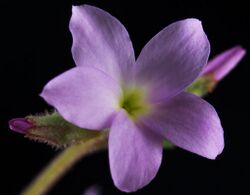Biology:Suksdorfia violacea
| Suksdorfia violacea | |
|---|---|

| |
| Scientific classification | |
| Kingdom: | Plantae |
| Clade: | Tracheophytes |
| Clade: | Angiosperms |
| Clade: | Eudicots |
| Order: | Saxifragales |
| Family: | Saxifragaceae |
| Genus: | Suksdorfia |
| Species: | S. violacea
|
| Binomial name | |
| Suksdorfia violacea Gray
| |
| Synonyms[1][2] | |
| |
Suksdorfia violacea is an uncommon species of herbaceous flowering plant in the saxifrage family known by the common name violet suksdorfia.[3] In 1879 Asa Gray named the genus Suksdorfia after Wilhelm Nikolaus Suksdorf who had first collected a specimen of S. violacea in 1878 near Mount Adams-White Salmon, Washington and sent it to Gray for assistance in classifying it. Gray and Suksdorf had a long and close working relationship, and Gray initially identified and named various species found by Suksdorf.[4] Its conservation status has been rated by NatureServe as "G4 – Apparently Secure".[5]
Taxonomy
Suksdorfia violacea is the type species for this genus and Gray named it after Suksdorf.[4] The genus name Hemieva Raf. was published earlier than Suksdorfia, but was less well known, and Suksdorfia is now a conserved name.[6] Therefore, Hemieva violacea, although correct when it was published in 1896 is no longer the correct name for this species.[7]
Ecology
Suksdorfia violacea is found in Washington, British Columbia, Oregon, Alberta, Montana, and Idaho.[8] It is most common in Washington and southeast British Columbia.[9] It prefers moist areas with rocks, crevices, ledges, and fences.[8][10] It is a perennial that grows from rhizomes. It has petiolate rounded leaves that are 1–2.5 centimeters (0.39–0.98 in) wide. The calyx is a slender bell shape. The flower is a five-lobed, violet-colored, slender, tapered, and with 5 stamens. The fruits are 4–6 millimeters (0.16–0.24 in) long and have 0.5 millimeters (0.020 in) brown seeds.[8][10] The plants usually grow to a height of 10–20 centimeters (3.9–7.9 in) in small groups at lower elevations.[10][11][12]
References
- ↑ Tropicos 2015.
- ↑ Nicolson & Wiersema 2015.
- ↑ Qian & Klinka 1998, p. 519.
- ↑ 4.0 4.1 Love 1998, pp. 173–174.
- ↑ NatureServe 2014.
- ↑ Jones 1933, pp. 128–129.
- ↑ Kew 2015.
- ↑ 8.0 8.1 8.2 Washington State University Herbarium 2015.
- ↑ Pacific Northwest Flowers 2013.
- ↑ 10.0 10.1 10.2 University of British Columbia 2014.
- ↑ Montana Field Guide 2015.
- ↑ Kershaw 2001, p. 120.
Bibliography
- Jones, George Neville (April 1933). "Wilhelm N. Suksdorf". Washington Historical Quarterly 24 (2). http://journals.lib.washington.edu/index.php/WHQ/article/view/8627/7662. Retrieved January 19, 2015.
- Kershaw, Linda (2001). Rare Vascular Plants of Alberta. Calgary: University of Alberta Press. ISBN 0-88864-319-5. https://books.google.com/books?id=cCUNmrHbMHsC&pg=PA120.
- Love, Rhoda M. (Fall 1998). "Wilhelm Nikolaus Suksdorf (1850-1932) Pioneer Botanist of the Pacific Northwest". Pacific Northwest Quarterly. http://www.herbarium.unc.edu/Collectors/Suksdorf.pdf.
- Nicolson, Dan; Wiersema, John. "Proposals and Disposals: An Accounting of Algal, Fungal, and Plant Nomenclature Proposals". Smithsonian National Museum of Natural History. http://botany.si.edu/references/codes/props/index.cfm.
- Qian, Hong; Klinka, Karel (1998). Plants of British Columbia. Seattle: University of Washington Press. ISBN 978-0-774-80652-7. https://books.google.com/books?id=cBciWJHM5GkC&pg=PA519.
- "Hemieva violacea (A. Gray) Wheelock". The Plant List Kew Gardens. http://www.theplantlist.org/tpl1.1/record/tro-50227066.
- "Suksdorfia violacea". Nature Serve Explorer. 2015. http://explorer.natureserve.org/servlet/NatureServe?sourceTemplate=tabular_report.wmt&loadTemplate=species_RptComprehensive.wmt&selectedReport=RptComprehensive.wmt&summaryView=tabular_report.wmt&elKey=136641&paging=home&save=true&startIndex=1&nextStartIndex=1&reset=false&offPageSelectedElKey=136641&offPageSelectedElType=species&offPageYesNo=true&post_processes=&radiobutton=radiobutton&selectedIndexes=136641.
- "Suksdorfia violacea". Pacific Northwest Flowers. 2013. http://www.pnwflowers.com/flower/suksdorfia-violacea.
- "Suksdorfia violacea". Tropicos. http://tropicos.org/Name/29100116.
- "Suksdorfia violacea". Washington State University Herbarium. 2015. http://biology.burke.washington.edu/herbarium/imagecollection.php?SciName=Suksdorfia%20violacea.
- "Suksdorfia violacea A. Gray". University of British Columbia. 2015. http://linnet.geog.ubc.ca/Atlas/Atlas.aspx?sciname=Suksdorfia%20violacea0.
- "Violet Suksdorfia - Suksdorfia violacea". State of Montana. 2015. http://fieldguide.mt.gov/speciesDetail.aspx?elcode=PDSAX0W020.
External links
Wikidata ☰ Q17781624 entry
 |
